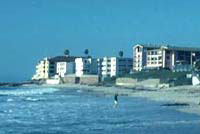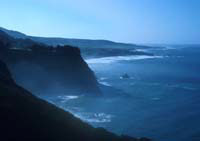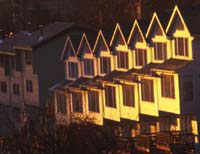In the latest initiative by developers to go green, a consortium of builders has created the “Condo Restoration Fund.” Condos, which once ranged freely over the California landscape, are now being displaced by red-legged frogs, pocket mice, giant kangaroo rats, and other ridiculous creatures, said Diggem Fast, the president of the fund.

Can these condos be saved?
The move comes, Fast said, in response to the recent designation of 4.1 million acres as critical habitat for the threatened California red-legged frog.
“Give a red-legged frog an inch and he’ll take a mile,” Fast said. “It’s the most destructive kind of amphibian sprawl.” Endangered species like the red-legged frog need to learn to share the earth with humans, according to Fast. “They’re mating in our water, claiming ponds that with a little bulldozing could become high-priced lots,” he said. “These creatures used to hop over this land in the millions and if we don’t impose some growth limits on them, that’s just what we’ll have again. And don’t get me started on the kangaroo rat. I bet a lot of them just hop across the border without any documents.”
Leading a tour to a bluff overlooking the Pacific Ocean, Fast waved his hand around to illustrate how well condos do here given half a chance. The bluff used to be nothing but coastal sage scrub. “Now you could not get more natural habitat for a condo than this bluff,” he explained. “Condos thrive in this kind of coastal environment. They slide down the cliffs now and then and you lose a few, but that’s nature for you. Condos are adapted to that kind of threat. They evolved with it.”

Prime condo habitat.
Back in his office, Fast pointed to a map his organization has drawn up detailing the best natural condo habitat in the state. The science behind his program, he said, has been proven to work. “We breed condos in captivity and take them out and let them go. We give them a little transitional support — wells, sewer lines, a couple of highways, and a mall or two. We’ve found it to be more successful if we give them an initial golf course.”
Countering arguments that taxpayers are essentially subsidizing condo reintroduction efforts, Fast commented, “It’s expensive bringing back the condo, but remember, extinction is forever. Think of the money that goes to supporting nothing built on land for those stupid frogs — nothing!”
Fast is optimistic that it’s a new day in Washington, D.C., and that the listing of the California condo as an endangered species will sail through. “We expect this enlightened administration to take a hard line against endangered species creep, where every useless creature wants in. Pocket mice? Give me a break.” There was no comparison, Fast said, between the value of a mouse — with or without a pocket — and a 3,000-square-foot condominium with mountain or ocean views. His organization believes large areas of California should be considered critical habitat for the condo. “What are we going to tell our grandchildren if we allow scrubby coastal cliffs to remain that way?” he asked. “The time to act is now, before it’s too late.”
Enviros Are Hopping Mad
National environmental groups condemned the Condo Restoration Fund, but said they had not yet decided on an appropriate response.
Meanwhile, outside the fund’s headquarters, members of a group calling itself the “Spirit of the Frog Society” demonstrated by painting their legs red and hopping around. One demonstrator described the group as a recent metamorphosis of an earlier group known as “Totally Against Development by People of Land Everywhere,” or TADPOLE.

Captive-bred condos try to make it in the wild.
The Condo Restoration Fund has received a large grant from the Billdem and Sellem Foundation and expects private contributions from builders to pour in.
“If this captive breeding program succeeds,” Fast said, “we’d like to use our scientific expertise to develop a similar program for office parks.” Office parks, he said, are a critical part of a diverse landscape without which the natural balance is lost and highways, airports, and even shopping malls could be at risk.
Fast dismissed criticism from one national environmental group that his organization is focusing on the California condo simply because it is a charismatic species that tugs at people’s heartstrings, given its associations with the concept of home.
“We consider the California condo a kind of umbrella species,” he said. “Restore the condo, and you’ll see all kinds of other valuable species — McDonald’s, Home Depots, Gaps — protected as well. Our vision is to protect and restore the California condo to its rightful place in the landscape.”


